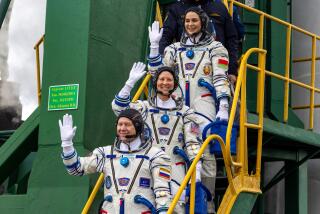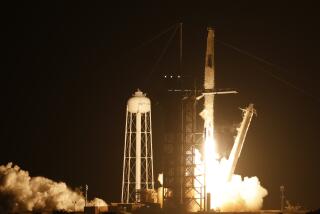Russia Launches Space Station Living Quarters
- Share via
BAIKONUR, Kazakhstan — The Russian Proton-K rocket that is carrying the long-delayed international space station’s service module into orbit lifted off today from the Baikonur cosmodrome.
At Mission Control outside Moscow, Russian and U.S. space agency officials anxiously monitored a live feed from the cosmodrome broadcast on their console video screens. A huge screen in front of them displayed the countdown at the cosmodrome on the remote, wind-swept steppes of Kazakhstan.
Russia and the United States have invested high hopes in the Zvezda module, which will be the core of the 16-nation space station project. The module will contain flight controls, the sewage system and sleeping quarters for the crew.
Russia says the 22-ton, 43-foot-long segment cost about $320 million to build. It has severely taxed Moscow’s meager financial resources and thrown the U.S.-led space station project more than two years behind schedule, casting doubts on Russia’s reliability as a major partner.
The launch could have come sooner if not for two crashes of Proton rockets. Russia insists that problems with the rocket have been worked out.
The Zvezda module will go into orbit unmanned, docking July 26 by computer with two other space station components that were launched in 1998. The first crew could go to the station by October, NASA has said.
Two cosmonauts will be prepared to immediately launch to Zvezda aboard a Soyuz rocket if the automatic linkup doesn’t work.
A failed launch would have been a major setback for the project.
More to Read
Sign up for Essential California
The most important California stories and recommendations in your inbox every morning.
You may occasionally receive promotional content from the Los Angeles Times.










